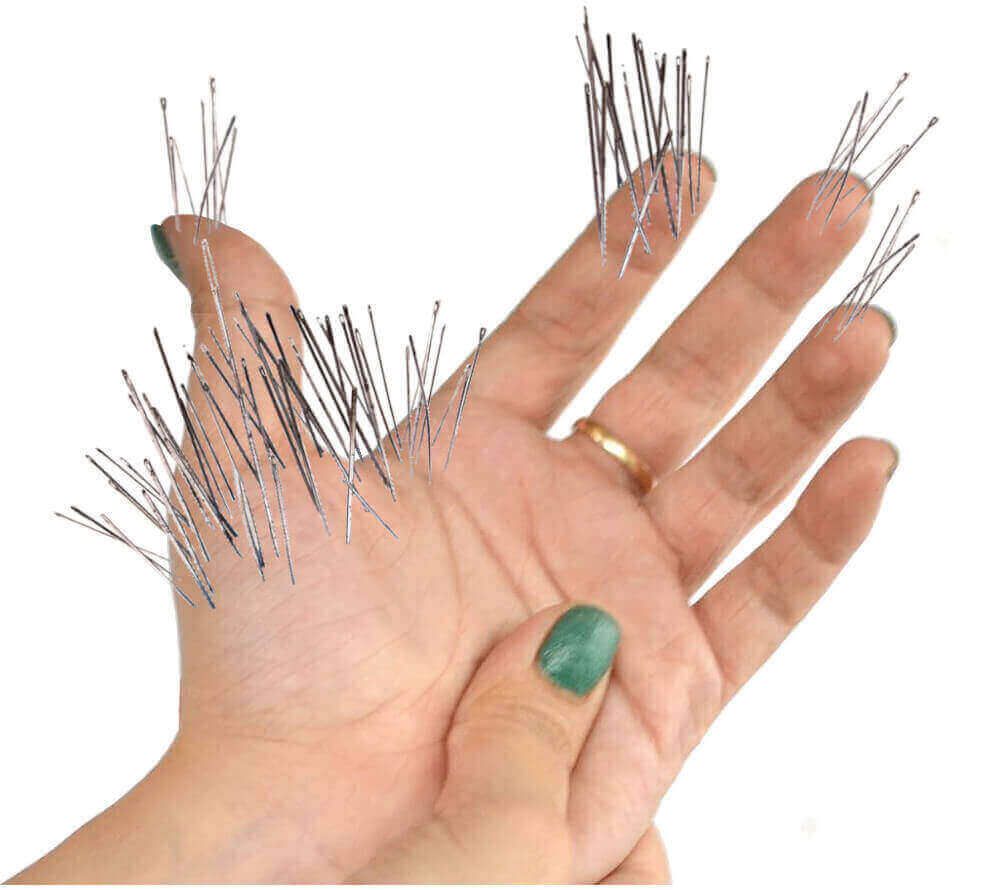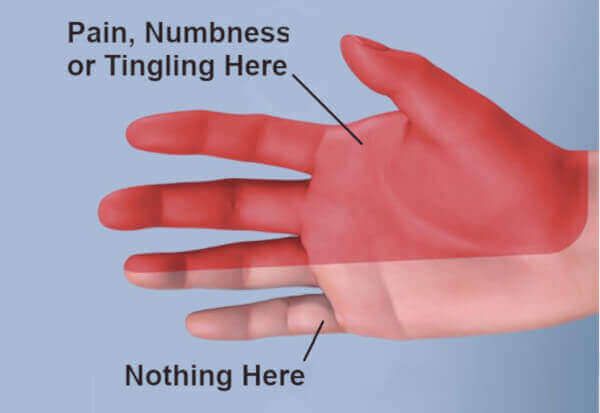How Obesity & Carpal Tunnel are Related
From Dr. Z - Carpal tunnel syndrome specialist
Are Obesity & Carpal Tunnel Related?
New studies show that obesity & carpal tunnel syndrome are most definitely related. In fact, the association between the two conditions is very strong. But it's also very complicated.
We know for sure that your probability of developing carpal tunnel syndrome increases many-fold if you're both small framed and obese. But we don't know the biological mechanisms which connect these two factors.
This article summarizes what medical science knows right now.
- FIND OUT: do you have carpal tunnel? No strings attached self-test.
Two separate but related problems
Anybody not living under a rock knows obesity is today's most important global health crisis. It's even more important than COVID-19 because far more people die from the consequences of obesity than from the pandemic.
Actually, obesity is the number one health problem in America. And it shows no sign of subsiding, especially in children. But on the positive side, the FDA just announced (December 2022) approval of an anti-obesity drug for teenagers.
And the obesity problem is much deeper than anybody thought. Specifically, we now know that obesity causes epigenetic changes. As shown in a recent study (January 2023), it means, for instance, even after eliminating a high fat diet that makes you obese, your immune system is still persistently compromised.
And while obesity is the number one health problem in America, it shows no sign of subsiding, especially in children. But on the positive side, the FDA just announced (December 2022) approval of an anti-obesity drug for teenagers. This is in addition to the popular use of metformin to curb the diabetes trend.
Okay, so obesity is the most common health problem. But do you know one of the most common nerve disorder in America? It's carpal tunnel syndrome!
Yes, obesity & carpal tunnel syndrome are American's number one health problem and number one nerve disorder, respectively. So it comes as no surprise that you probably can have both conditions at the same time.
But are these two problems related? The answer is yes. Doctors and scientists around the world are just starting to see some of the biological relationships between these two disorders.
Symptoms of carpal tunnel syndrome
Carpal tunnel syndrome happens when fluid pressure deep inside the wrist joint increases. This can be caused by one or more factors. What's common to each factor is that flexor tendons in the wrist inflame and swell. It's that swelling which increases the fluid pressure inside the wrist.
As the internal wrist pressure rises, tissues begin to push on the
median nerve. This major nerve of the hand controls sensations (or "feelings") from the palm and fingers.
But when the median nerve is compressed and ultimately crushed it begins to produce unusual sensations. These are the hallmark signs of carpal tunnel syndrome. They include:
- Hand or finger pain, burning, numbness, tingling, and pins & needles.
- Weakness and loss of grip strength or pinch strength.
- Sometimes you have feelings of shooting electric shocks in the hand.
- Symptoms will keep you awake at night.
As carpal tunnel syndrome advances, it enters the
severe stage. This is when symptoms escalate to "excruciating" or "punishing" levels. Patients often lose the ability to sense hot and cold in their fingertips. Loss of hand strength and dexterity is catastrophic.
Wrist shape, obesity & carpal tunnel syndrome
So how are obesity & carpal tunnel syndrome related? The answers become clearer from patient surveys and population research.
Another recent study examined hand and wrist shape as well as body mass index (BMI). Researchers collected the data and compared it to the incidence of carpel tunnel syndrome.
Their results confirmed 2 key factors that increased the probability of getting of carpal tunnel syndrome.
- First, the wrist’s anatomical
shape
is a major correlation to having carpal tunnel syndrome. Individuals with smaller diameter limbs ("small-framed" people) are at higher risk for developing carpal tunnel syndrome.
- Second, a direct association between obesity & carpal tunnel syndrome was confirmed. A BMI greater than 30 puts you at high risk of seeing carpal tunnel symptoms.
Therefore, your probability of getting carpal tunnel syndrome increases many-fold if you're both small framed and obese.
The link between obesity & carpal tunnel syndrome
While obesity is most definitely associated with carpal tunnel syndrome, the relationship is not a simple one. In fact, another study demonstrated something surprising.
Subsequent weight loss in obese patients with carpal tunnel syndrome did not bring symptoms relief. This is unexpected.
Therefore, the link between obesity & carpal tunnel syndrome is not a simple “cause and effect”. Instead, the researchers suggest there may be a
common genetic factor
between the two conditions.
A genetic factor would likely operate in such a way where patients with one condition probably have a genetic trigger for producing the other condition. And since family history is a major predictive factor of carpal tunnel syndrome, this genetic relationship is not surprising.
For the most part, at some point in their life about 10% of people in the general population will develop carpal tunnel syndrome. In contrast, about 25% of obese people already have carpal tunnel syndrome.
Therefore, the totality of scientific data confirms the strong relationship between obesity & carpal tunnel syndrome. The association may involve common genetic factors that link the two conditions. However, there still is no
direct
evidence suggesting obesity
causes
carpal tunnel syndrome.
Other risk factors
We already established that your probability of getting carpal tunnel syndrome increases if you're already obese. And that probability increase if you're a small-framed person.
But what if you have other things going on, like a chronic illness or you're pregnant?
Doctors and scientists know for sure that certain risk factors increase your likelihood of getting carpal tunnel syndrome. Any one of these risk factors can increase your probability of getting this hand disorder.
And having more than one risk factor only increases your chances that much more.
Aside from obesity and having a small frame, here is a list of other risk factors for developing carpal tunnel syndrome:
- Having a family history (parent or sibling) of carpal tunnel syndrome
- Being female puts you several times higher at risk
- Pregnancy, especially in the third trimester
- Wrist trauma
- Repetitively stressing your fingers and hand
- Rheumatoid arthritis
- Working with vibrating tools
- Nerve damage
- Metabolic disturbance (like diabetes, menopause, metabolic syndrome)
- Old age
- Excessive alcohol consumption
- Stress and anxiety
- Liver disease
- Hypothyroidism
- Medications (mostly those used to treat cancer)
- Chronic fatigue syndrome
- Fibromyalgia
- Lyme disease
- Hemodialysis
- Tumor in the wrist
- Other medical conditions (like lymphedema, gout, kidney failure)
Conclusion
There is a definite relationship between obesity & carpal tunnel syndrome. However, it’s not a simple “cause and effect” relationship. For instance, you might be obese and have carpal tunnel syndrome. But simply losing weight does not increase your chances that symptoms will disappear.
The take-home message about obesity & carpal tunnel syndrome is:
- If you’re already obese but don’t have carpal tunnel syndrome, your chances of getting it are greatly increased.
- If you're also small-framed, you can increase those chances even more.
- Your chances further increase if - in addition - you have any of the above risk factors.
Sources
- K Chiotis, et al: Role of Anthropometric Characteristics in Idiopathic Carpal Tunnel Syndrome, Archives of Physical Medicine and Rehabilitation Volume 94, Issue 4 , Pages 737-744, April 2013
- Sharifi-Mollayousefi A, et al: Assessment of body mass index and hand anthropometric measurements as independent risk factors for carpal tunnel syndrome, Folia Morphol (Warsz) 67 (1): 36–42. 2008
- Kurt, S, et al: Obesity and Carpal Tunnel Syndrome: Is There a Causal Relationship, Eur Neurol 59(5):253-7, 2008
- Semiha K, et al: Carpal tunnel syndrome and the relationship between body mass index, age and gender, 52 (4) 2006
- Karpitskaya Y, et al: Prevalence of smoking, obesity, diabetes mellitus, and thyroid disease in patients with carpal tunnel syndrome, Ann Plast Surg 48:269-273, 2002
- Lam N, and Thurston A: Association of obesity, gender, age and occupation with carpal tunnel syndrome, Aust NZ J Surg 68:190-193, 1998








